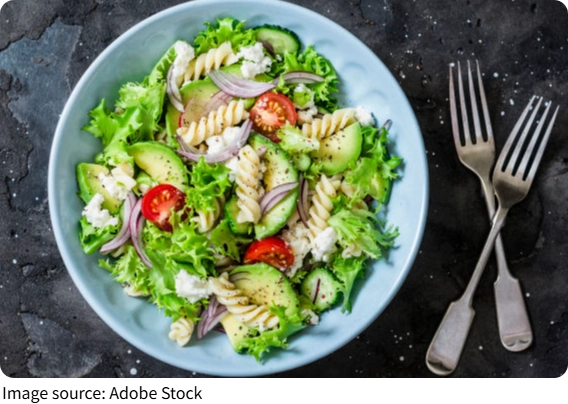3 Veg Meals You'll Crave!

Great Day, Lykkers! Maintaining a vegetarian diet isn't just about skipping meat—it's about crafting meals that are rich in vitamins, minerals, and satisfying textures.
The following recipes go beyond the basics, offering a blend of whole foods, balanced macro-nutrients, and culinary creativity.
Each dish is designed to support digestive health, energy levels, and overall well-being!
1. Spiced Lentil and Quinoa Power Bowl
Nutrient Focus: High in plant protein, iron, magnesium, and fiber
This recipe combines two superstars—lentils and quinoa—into a nutrient-dense bowl that delivers lasting energy. Red lentils, in particular, cook quickly and are easier to digest than other legumes, making them ideal for those new to vegetarian eating.
Ingredients:
½ cup dry red lentils
½ cup quinoa (rinsed)
1 medium sweet potato (cubed)
1 cup chopped kale
2 tbsp tahini
1 tsp cumin
½ tsp turmeric
Juice of ½ lemon
2 tbsp olive oil
Salt and pepper to taste
Preparation:
1. Simmer lentils and quinoa separately until tender (about 15–20 minutes).
2. Roast the sweet potato cubes at 400°F (200°C) with olive oil, turmeric, and cumin for 25 minutes.
3. In a large bowl, combine all ingredients. Drizzle with a lemon-tahini dressing and sprinkle sea salt to balance the earthy flavor.
Why It Works: This meal provides a complete amino acid profile and supports anti-inflammatory processes thanks to turmeric and kale. Unlike traditional grain bowls, this version avoids excess sodium and uses natural oils for better heart health.
2. Stuffed Bell Peppers with Chickpea-Mushroom Filling
Nutrient Focus: B12-supportive ingredients, gut health, and antioxidants
Vegetarians often struggle to replace the rich umami depth of meat—but mushrooms, when paired with chickpeas and roasted peppers, hit that savory note beautifully. This recipe brings color, crunch, and complexity to the plate.
Ingredients:
4 large bell peppers (any color)
1 can chickpeas (rinsed and mashed)
1 cup finely chopped mushrooms (cremini or shiitake for better depth)
½ red onion, diced
2 cloves garlic, minced
1 tsp smoked paprika
½ tsp thyme
1 tbsp olive oil
2 tbsp nutritional yeast (optional but adds B-vitamin boost)
Fresh parsley for garnish
Preparation:
1. Cut tops off bell peppers and remove seeds.
2. Sauté onion, garlic, and mushrooms in olive oil for 5 minutes. Add mashed chickpeas, spices, and nutritional yeast.
3. Stuff each pepper with the filling and bake at 375°F (190°C) for 30–35 minutes. Garnish with parsley before serving.
Why It Works: Chickpeas offer fiber and plant protein, while mushrooms contain ergothioneine, an antioxidant that supports cellular repair. Nutritional yeast, often used in vegan diets, enhances B-vitamin intake, including B12 analogs.
3. Zucchini Noodles with Creamy Avocado-Basil Sauce
Nutrient Focus: Healthy fatty, potassium, and raw enzymes
Zoodles (zucchini noodles) are more than a carb substitute—they're a way to incorporate raw, hydrating vegetables into your diet while still enjoying a pasta-like dish. The creamy avocado sauce adds richness without any dairy.
Ingredients:
2 medium zucchinis (spiralized)
1 ripe avocado
1 clove garlic
Juice of 1 lime
½ cup fresh basil leaves
2 tbsp extra olive oil
Salt and black pepper to taste
Cherry tomatoes (halved) and pumpkin seeds for topping
Preparation:
1. Spiralize zucchini and set aside (do not cook).
2. Blend avocado, lime juice, garlic, basil, and olive oil until smooth.
3. Toss zoodles with the sauce and top with fresh tomatoes and seeds for crunch. Serve immediately.
Why It Works: Raw zucchini delivers enzymes that support digestion, while avocado contributes monounsaturated fats that aid nutrient absorption. The lime enhances the bio-availability of iron from the basil and greens.
A bonus: It takes under 10 minutes to prepare.

These three vegetarian meals offer more than meatless alternatives—they deliver balanced nutrition, vibrant colors, and textures that keep meals satisfying and exciting. Unlike repetitive grain-heavy options, each recipe above prioritizes micronutrient diversity, heart-healthy fats, and functional ingredients that promote long-term health.
Incorporating meals like these into your weekly rotation can improve energy, support digestion, and help maintain a strong immune system—no supplements required. The next time you think vegetarian equals boring, give one of these a try and taste the difference that nutrient-smart cooking can make!
-
 Chipmunks' Secret StrengthTiny Yet Mighty: Discover the Amazing Survival Secrets of Chipmunks!
Chipmunks' Secret StrengthTiny Yet Mighty: Discover the Amazing Survival Secrets of Chipmunks! -
 Peeled Peas JourneyWhy Peeled Peas Are the Secret Superfood You've Been Missing Out On!
Peeled Peas JourneyWhy Peeled Peas Are the Secret Superfood You've Been Missing Out On! -
 Time Travel PossibilitiesCan We Really Travel Through Time? Scientists Explore How Time Travel Might Actually Be Possible!
Time Travel PossibilitiesCan We Really Travel Through Time? Scientists Explore How Time Travel Might Actually Be Possible!